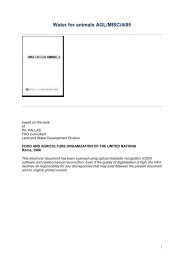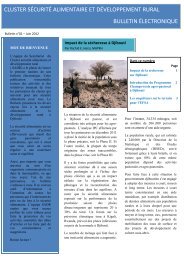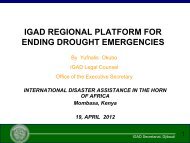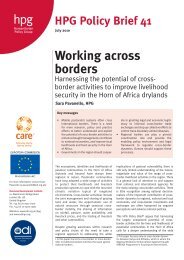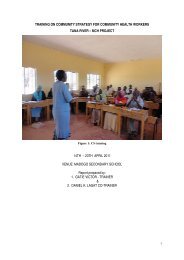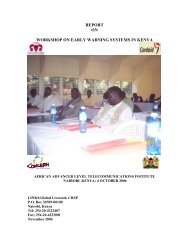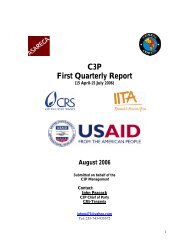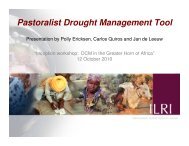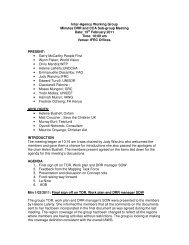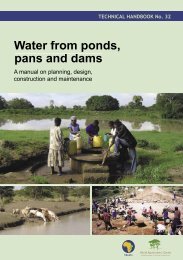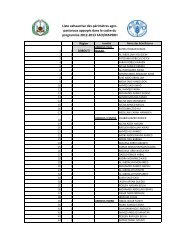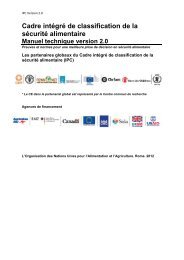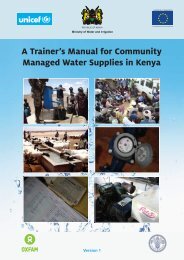4.3 C<strong>on</strong>clusi<strong>on</strong>, ways forward <str<strong>on</strong>g>and</str<strong>on</strong>g> recommendati<strong>on</strong>sThis report provides an overview <str<strong>on</strong>g>of</str<strong>on</strong>g> water development in Ethiopia’s rangel<str<strong>on</strong>g>and</str<strong>on</strong>g>s in order to inform<str<strong>on</strong>g>and</str<strong>on</strong>g> improve <strong>the</strong> partners’ work <str<strong>on</strong>g>and</str<strong>on</strong>g> encourage dialogue <str<strong>on</strong>g>and</str<strong>on</strong>g> debate around water developmentissues specific to pastoral regi<strong>on</strong>s. It provides an examinati<strong>on</strong> <str<strong>on</strong>g>and</str<strong>on</strong>g> discussi<strong>on</strong> <str<strong>on</strong>g>of</str<strong>on</strong>g> current actors,practice <str<strong>on</strong>g>and</str<strong>on</strong>g> policies in <strong>the</strong> water development arena, <str<strong>on</strong>g>and</str<strong>on</strong>g> also puts forward poor <str<strong>on</strong>g>and</str<strong>on</strong>g> bad practiceas identified by major stakeholders.Findings indicate that to improve water development, local c<strong>on</strong>texts need to be understood <str<strong>on</strong>g>and</str<strong>on</strong>g>c<strong>on</strong>sidered, l<str<strong>on</strong>g>and</str<strong>on</strong>g> users involved to guide <str<strong>on</strong>g>and</str<strong>on</strong>g> inform what is <str<strong>on</strong>g>and</str<strong>on</strong>g> isn’t appropriate, <str<strong>on</strong>g>and</str<strong>on</strong>g> existingcustomary l<str<strong>on</strong>g>and</str<strong>on</strong>g> management strategies built up<strong>on</strong> (see table 7). The government’s WSDP highlightsthat “<strong>the</strong> most important policy <str<strong>on</strong>g>and</str<strong>on</strong>g> regulatory interventi<strong>on</strong>s in terms <str<strong>on</strong>g>of</str<strong>on</strong>g> <strong>the</strong>ir negative impacts <strong>on</strong><strong>the</strong> envir<strong>on</strong>ment were those impositi<strong>on</strong>s which increasingly <str<strong>on</strong>g>and</str<strong>on</strong>g> cumulatively eroded <strong>the</strong> rights <str<strong>on</strong>g>of</str<strong>on</strong>g>individuals <str<strong>on</strong>g>and</str<strong>on</strong>g> communities to use <str<strong>on</strong>g>and</str<strong>on</strong>g> manage <strong>the</strong>ir own resources” (MoWR, 2002: 122).Grassroots participati<strong>on</strong> is clearly enshrined in Ethiopia’s C<strong>on</strong>stituti<strong>on</strong>, <str<strong>on</strong>g>and</str<strong>on</strong>g> in order to effectivelyaddress inappropriate water development in <strong>the</strong> rangel<str<strong>on</strong>g>and</str<strong>on</strong>g>s, it is sensible to take <strong>the</strong> best that <strong>the</strong>technical <str<strong>on</strong>g>and</str<strong>on</strong>g> scientific community has to <str<strong>on</strong>g>of</str<strong>on</strong>g>fer <str<strong>on</strong>g>and</str<strong>on</strong>g> combine this with customary knowledge systems.Table 7: Reflecti<strong>on</strong>s <strong>on</strong> participati<strong>on</strong>Changes1991sinceWhere observed Challenges* Recommendati<strong>on</strong>sMore emphasis <strong>on</strong>participati<strong>on</strong>Water policies, strategies <str<strong>on</strong>g>and</str<strong>on</strong>g>programs emphasise communityparticipati<strong>on</strong> in waterdevelopment.i. The term community is <str<strong>on</strong>g>of</str<strong>on</strong>g>tenill-defined or not defined at all.This makes selectingcommunity members who aretruly representative <str<strong>on</strong>g>of</str<strong>on</strong>g> <strong>the</strong>wider set <str<strong>on</strong>g>of</str<strong>on</strong>g> stakeholders achallenge.a. Define 'community',underst<str<strong>on</strong>g>and</str<strong>on</strong>g> <strong>the</strong> social,ec<strong>on</strong>omic <str<strong>on</strong>g>and</str<strong>on</strong>g> politicalfactors at play locally, selectrepresentative communitymembers, <str<strong>on</strong>g>and</str<strong>on</strong>g> select <strong>the</strong>scale <str<strong>on</strong>g>of</str<strong>on</strong>g> interventi<strong>on</strong>commensurate with <strong>the</strong>appropriate livelihood z<strong>on</strong>e.Community membersengaged should represent<strong>the</strong> different social,livelihood, wealth, age,religious <str<strong>on</strong>g>and</str<strong>on</strong>g> gender groups.ii. No comm<strong>on</strong> underst<str<strong>on</strong>g>and</str<strong>on</strong>g>ing<str<strong>on</strong>g>of</str<strong>on</strong>g> <strong>the</strong> term participati<strong>on</strong> <str<strong>on</strong>g>and</str<strong>on</strong>g>no comm<strong>on</strong> approach topromoting it. Ambiguity inwhat is meant by <strong>the</strong> term seesmultiple approaches toensuring participati<strong>on</strong> in <strong>the</strong>rangel<str<strong>on</strong>g>and</str<strong>on</strong>g>s, running <strong>the</strong> gamutfrom token to effectiveparticipati<strong>on</strong>.b. Define 'participati<strong>on</strong>' <str<strong>on</strong>g>and</str<strong>on</strong>g>how 'community' (above)will be involved. Alsopromote dialogue betweenpractiti<strong>on</strong>ers <str<strong>on</strong>g>and</str<strong>on</strong>g>pastoralists to shareexperience <strong>on</strong> what does<str<strong>on</strong>g>and</str<strong>on</strong>g> doesn't work indifferent pastoral c<strong>on</strong>texts.iii. Weak focus <strong>on</strong> buildingcapacity <str<strong>on</strong>g>of</str<strong>on</strong>g> communities(Water User Associati<strong>on</strong>s oro<strong>the</strong>r committees/groupsacting <strong>on</strong> behalf <str<strong>on</strong>g>of</str<strong>on</strong>g> <strong>the</strong>community) to plan, manage,operate <str<strong>on</strong>g>and</str<strong>on</strong>g> maintain waterpoints. This weakens <strong>the</strong>capacity to participate in aswell as 'own' projects.c. Increase focus <strong>on</strong> <strong>the</strong>'s<str<strong>on</strong>g>of</str<strong>on</strong>g>tware' comp<strong>on</strong>ent <str<strong>on</strong>g>of</str<strong>on</strong>g>projects <str<strong>on</strong>g>and</str<strong>on</strong>g> put in placeindicators at <strong>the</strong> outset <str<strong>on</strong>g>of</str<strong>on</strong>g>interventi<strong>on</strong>s which wouldhelp measure capacity built<str<strong>on</strong>g>and</str<strong>on</strong>g> livelihoods improved,not just physicalinterventi<strong>on</strong>s completed.80
iv. More emphasis <strong>on</strong> involvingcommunities in management<str<strong>on</strong>g>and</str<strong>on</strong>g> maintenance <str<strong>on</strong>g>and</str<strong>on</strong>g> less inplanning. This may compromisebuy-in to schemes if planned inisolati<strong>on</strong> from community. Thisalso makes practiti<strong>on</strong>ersvulnerable to establishing waterpoints that may disrupt social<str<strong>on</strong>g>and</str<strong>on</strong>g> ecological patterns.d. Ensure participati<strong>on</strong> in allstages <str<strong>on</strong>g>of</str<strong>on</strong>g> waterdevelopment, whichimportantly includesplanning.* There are also notable overarching challenges including an unfavourable pastoral policy envir<strong>on</strong>ment, extremely ambitiousnati<strong>on</strong>al water development targets which may undermine quality in favour <str<strong>on</strong>g>of</str<strong>on</strong>g> quantity, <str<strong>on</strong>g>and</str<strong>on</strong>g> a dearth <str<strong>on</strong>g>of</str<strong>on</strong>g> skilled manpower inpastoral regi<strong>on</strong>s.Currently in Ethiopia, approaches to water development <str<strong>on</strong>g>and</str<strong>on</strong>g> community participati<strong>on</strong> are disjointedbetween different projects <str<strong>on</strong>g>and</str<strong>on</strong>g> programs, <str<strong>on</strong>g>and</str<strong>on</strong>g> also between different actors <str<strong>on</strong>g>and</str<strong>on</strong>g> sectors. In general,approaches range from highly technocratic, with generic methods <str<strong>on</strong>g>of</str<strong>on</strong>g> promoting participati<strong>on</strong> (<str<strong>on</strong>g>of</str<strong>on</strong>g>tentokenistic), to highly participatory approaches which are c<strong>on</strong>fined to specific spatial <str<strong>on</strong>g>and</str<strong>on</strong>g> sociopoliticalsettings. There is little coordinati<strong>on</strong> <str<strong>on</strong>g>and</str<strong>on</strong>g> knowledge sharing between different groups <str<strong>on</strong>g>of</str<strong>on</strong>g>actors. No comm<strong>on</strong> guidelines exist for <strong>the</strong> development <str<strong>on</strong>g>of</str<strong>on</strong>g> water for productive use in <strong>the</strong> pastoralc<strong>on</strong>text, <str<strong>on</strong>g>and</str<strong>on</strong>g> <strong>the</strong>re is also a need to streng<strong>the</strong>n linkages <str<strong>on</strong>g>and</str<strong>on</strong>g> improve complementarities betweenhumanitarian <str<strong>on</strong>g>and</str<strong>on</strong>g> development approaches <str<strong>on</strong>g>and</str<strong>on</strong>g> activities. Fur<strong>the</strong>rmore, most water developmentoccurs in isolati<strong>on</strong> from broader natural resource management, even though water is recognized asa key resource. Water is also <str<strong>on</strong>g>of</str<strong>on</strong>g>ten developed without due attenti<strong>on</strong> to o<strong>the</strong>r critical developmentneeds such as access to markets, health services for people <str<strong>on</strong>g>and</str<strong>on</strong>g> livestock, <str<strong>on</strong>g>and</str<strong>on</strong>g> educati<strong>on</strong>.Fur<strong>the</strong>r complicating matters is <strong>the</strong> dichotomy in macro-level thinking. On <strong>the</strong> <strong>on</strong>e h<str<strong>on</strong>g>and</str<strong>on</strong>g>, <strong>the</strong> policyenvir<strong>on</strong>ment in Ethiopia favours <strong>the</strong> settlement <str<strong>on</strong>g>of</str<strong>on</strong>g> pastoralists in <strong>the</strong> l<strong>on</strong>g term <str<strong>on</strong>g>and</str<strong>on</strong>g> <strong>the</strong> promoti<strong>on</strong> <str<strong>on</strong>g>of</str<strong>on</strong>g>irrigati<strong>on</strong> expansi<strong>on</strong>, seen by government as <strong>the</strong> <strong>on</strong>ly practical resp<strong>on</strong>ses to <strong>the</strong> challenges facingpastoralists in <strong>the</strong> rangel<str<strong>on</strong>g>and</str<strong>on</strong>g>s, <strong>on</strong> <strong>the</strong> o<strong>the</strong>r h<str<strong>on</strong>g>and</str<strong>on</strong>g>, d<strong>on</strong>ors, some government programmes <str<strong>on</strong>g>and</str<strong>on</strong>g> a fewdevelopment organizati<strong>on</strong>s favour supporting mobility as an essential pastoral coping strategy <str<strong>on</strong>g>and</str<strong>on</strong>g>promote <strong>the</strong> livelihood as a vehicle for ec<strong>on</strong>omic growth <str<strong>on</strong>g>and</str<strong>on</strong>g> development.Some shifts in water development thinking have been observed. Practiti<strong>on</strong>ers increasingly recognizethat:• Disjointed approaches to water development are an impediment to sustainable development in<strong>the</strong> rangel<str<strong>on</strong>g>and</str<strong>on</strong>g>s;• The lowl<str<strong>on</strong>g>and</str<strong>on</strong>g>s require a different approach to water development than <strong>the</strong> country’s agriculturalareas where rainfall is less spatially <str<strong>on</strong>g>and</str<strong>on</strong>g> temporally variable;• Mobility is an important means for pastoralists to resp<strong>on</strong>d <str<strong>on</strong>g>and</str<strong>on</strong>g> adapt to variable envir<strong>on</strong>ments;• Pastoral livelihoods are influenced by social, cultural <str<strong>on</strong>g>and</str<strong>on</strong>g> political aspects which differ within <str<strong>on</strong>g>and</str<strong>on</strong>g>between regi<strong>on</strong>s <str<strong>on</strong>g>and</str<strong>on</strong>g> must be properly understood;• Water points functi<strong>on</strong> within <strong>the</strong> broader l<str<strong>on</strong>g>and</str<strong>on</strong>g>scape <str<strong>on</strong>g>and</str<strong>on</strong>g> can alter patterns <str<strong>on</strong>g>of</str<strong>on</strong>g> resource use,underscoring <strong>the</strong> importance <str<strong>on</strong>g>of</str<strong>on</strong>g> underst<str<strong>on</strong>g>and</str<strong>on</strong>g>ing <strong>the</strong> existing natural resources in a locati<strong>on</strong> (water<str<strong>on</strong>g>and</str<strong>on</strong>g> pasture) <str<strong>on</strong>g>and</str<strong>on</strong>g> <strong>the</strong> way people use <strong>the</strong>se resources;• The s<str<strong>on</strong>g>of</str<strong>on</strong>g>tware comp<strong>on</strong>ent <str<strong>on</strong>g>of</str<strong>on</strong>g> water development requires much more focus if waterdevelopments are to be appropriate <str<strong>on</strong>g>and</str<strong>on</strong>g> sustainable, which means improving effectiveparticipati<strong>on</strong> in planning <str<strong>on</strong>g>and</str<strong>on</strong>g> implementati<strong>on</strong> <str<strong>on</strong>g>and</str<strong>on</strong>g> embedding <strong>the</strong> capacity at <strong>the</strong> local level tooperate, manage <str<strong>on</strong>g>and</str<strong>on</strong>g> maintain water points81
- Page 1 and 2:
Synthesis
- Page 4 and 5:
TABLE OF CONTENTSLIST OF ACRONYMS..
- Page 6 and 7:
ACKNOWLEDGMENTSI would like to exte
- Page 8 and 9:
LIST OF ACRONYMSACDI/VOCAACFAFDCDDC
- Page 10 and 11:
EXECUTIVE SUMMARYWater development
- Page 12 and 13:
understanding <str
- Page 14 and 15:
Agreed upon guidelines for water de
- Page 16 and 17:
• Make better use of</str
- Page 18 and 19:
to inform their own work an
- Page 20 and 21:
Within pastoral areas, it is recogn
- Page 23 and 24:
Section 2. Overview of</str
- Page 25 and 26:
Dohrn, 2006). Spatially variable ra
- Page 27 and 28:
The following broad overview touche
- Page 29 and 30: In areas of adequa
- Page 31 and 32: observed response was for individua
- Page 33 and 34: Specific to water development, seve
- Page 35 and 36: Section 3. Water development todayT
- Page 37 and 38: Eliciting payments for water from l
- Page 39 and 40: ureaus 25 . The ministry’s interv
- Page 41 and 42: National policy paints a conflictin
- Page 43 and 44: will be given to pastoralists to en
- Page 45 and 46: Water supplyGovernance and<
- Page 47 and 48: vulnerable to conversion for other
- Page 49 and 50: • Agro-pastoralists’ priorities
- Page 51 and 52: Although the WSDP principles are se
- Page 53 and 54: The Universal Access ProgramThe Uni
- Page 55 and 56: • Help ensure that public works d
- Page 57 and 58: However, the development model for
- Page 59 and 60: Figure 4: Proposed pilot la
- Page 61 and 62: Many international and</str
- Page 63 and 64: Furthermore, attention is given to
- Page 65 and 66: CARE International, under the GWI,
- Page 67: and traditional me
- Page 70 and 71: • Understand exi
- Page 72 and 73: 4.2 Key observations in the water d
- Page 74 and 75: epresent a firm attempt to preserve
- Page 76 and 77: learning from NGO experiences in Bo
- Page 78 and 79: However, there are currently no spe
- Page 82 and 83: In sum, pastoralism as a livelihood
- Page 84 and 85: • Water interventions selected sh
- Page 86 and 87: • Promote effective participation
- Page 88 and 89: Gebre-Mariam, A. (1982). Organizati
- Page 90: Schimann P. and Ph



